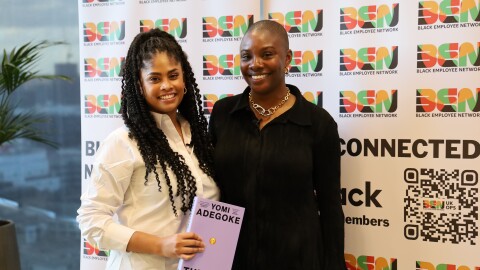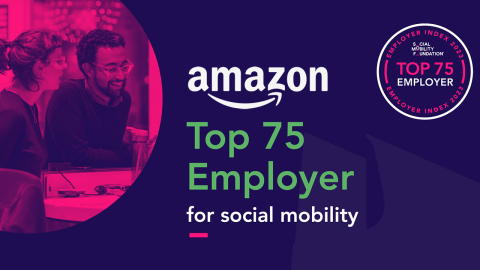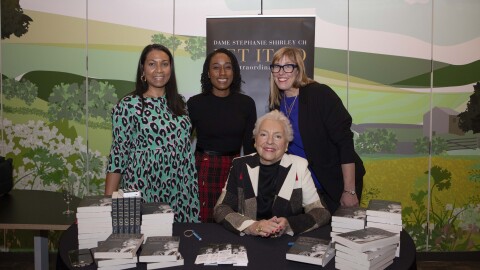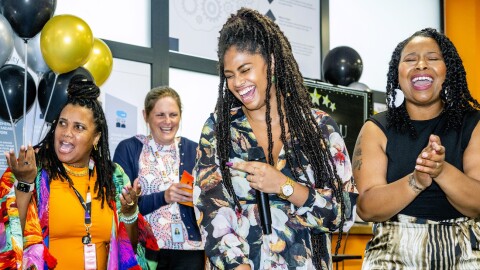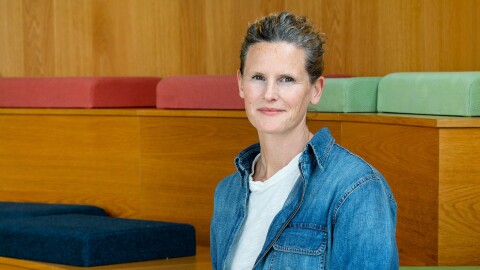Tour leaders at Amazon’s Fulfilment Centres have been exploring ‘STEMinism’ – thanks to new professional development sessions from education charity Teach First.
Teach First believes that a lack of visible role models for girls in STEM has exacerbated gender bias and led to fewer girls taking up STEM subjects beyond GCSE in the UK.
The charity has also revealed that the problem is even greater for girls from disadvantaged backgrounds, who are seven times less likely to choose A-level physics than a boy from a non-disadvantaged background.
As part of Teach First’s STEMinism campaign to tackle this problem, Fulfilment Centre tour leaders like Adam Asquith in Doncaster have been invited to workshops specially designed to explore what is holding girls back.
Behind-the-scenes in Doncaster
Adam has hosted thousands of visitors at our Doncaster Fulfilment Centre, where they come face-to-face with the cutting-edge technology that makes your Amazon order possible.

For schools and young people, tour leaders also run educational workshops that include activities such as coding robots and a game to plan and build your own warehouse system.
“At primary school age, we see how engaged and proactive girls can be with robotics, for example. They tend to think outside the box, learn the skills quickly, and approach the activity with maturity,” Adam explains.
“So it was surprising to discover that these girls are dropping off the radar later in life and becoming less engaged with STEM. This session really opened my eyes for the need to increase representation of female STEM pioneers and role models.”
“As a father of three daughters – aged two to eleven – we have always tried to help them to think differently about activities that might be seen as male-dominated, like sport or science. My eldest is already doing her own research about coronavirus, and the youngest has just got her season ticket for Barnsley!”
“Like a lot of parents, the experience of home-schooling our girls during lockdown has been an eye-opener about the importance of education, learning and development. You realise that parents, teachers and other educators like myself can all play a different role in how a young person’s ideas develop over childhood.”
“We may be aware subconsciously about our bias and how we represent certain professions, but the STEM workshop took my understanding to the next level in terms of where those preconception start and how we can change them.”
Adam has taken inspiration from the session to further his own understanding on education and the role he can play as a ‘STEMinist’ in the future – in fact he has already opted to tailor part of his Open University degree around Early Years Learning.
“The kids we host at our workshops are the next generation of builders and inventors. We understand the educational value that learning outside the classroom can provide – we can reinforce positive messages from parents and teachers.”
“At the end of each session, we ask the kids to design a new piece of technology. We get flying unicorns, time machines and package teleporters. But ten years ago, there were no drone deliveries, nor cloud computing or Virtual Reality. So our message is simple: there is no reason to think it’s impossible!”
Breaking down gender stereotypes
Emilie Sundorph, Policy Manager for Teach First, designed the ‘STEMinism’ workshop for business partners: “We want businesses to inspire each other and sync up their ideas. As a link between schools, teachers and partners like Amazon, Teach First can help to illustrate the symbiotic benefits of working together on this issue.”
She argues that breaking down gender stereotypes for girls is not only a matter of fairness – it’s also an economic imperative for the country as a whole. Today, only 12% of engineers are female and just 13% of STEM workers at management level are female. At the same time, estimates suggest that a shortage of STEM skills could cost UK businesses £1.5bn every year.

“We believe the lack of girls continuing with these subjects is leading to an untapped pool of talent that could help counter the country’s STEM labour crisis. Tour leaders like Adam can play a key role in reversing the trend.”
“One of the key challenges we face is how to have better, more informed and more effective conversations about careers in school. Businesses can help to answer this question, because interactions with a business or brand from an early age can have a concrete impact on a young person’s aspirations.”
“When Adam’s tour guests see behind-the-scenes at a Fulfilment Centre, they’re coming face-to-face with people who look, act and talk like them, and they’re looking at the real-world technology that makes so much of our lives possible. The educational value of that experience can be huge.”
“There is an important difference between a young person understanding what is possible in their career, and genuinely believing that it’s possible. We can reinforce that belief through interactions with businesses, better representation in the industry and greater visibility of female STEM role models in the media and the school curriculum.”
“It’s not as simple as saying that men can inspire boys, and women can inspire girls. This is a team effort. It doesn’t matter who does the empowering – what’s important is to be proactive in how we address underlying, gendered preconceptions about STEM careers.”
“This is about long-term change. We can all see how attitudes are rapidly changing and evolving across our society. When the next generation of young people go on to become employers and job creators, we want to ensure they understand the many benefits of diversity in this industry.”
How does Amazon promote gender equality in STEM?
We were delighted to receive Women in Tech’s Tech Employer of the Year 2019 Award in recognition of our commitment to gender diversity.
That commitment takes many forms, from Amazon Amplify and apprenticeships, to our work with the WISE Campaign, which encourages women and girls to pursue technical careers and qualifications.
Last year we launched Amazon Future Engineer in the UK, a comprehensive classroom-to-career education programme that will inspire, educate and enable children and young adults to try computer science.
As an official partner for International Women’s Day 2020, we were proud to support the event’s stated mission, Women at Work: “To champion women of all backgrounds who dare to innovate, lead, and uplift others towards a more equal and inclusive workplace.”




